Month 8:29, Week 4:7 (Shibi'i/Sukkot), Year:Day 5955:236 AM
2Exodus 9/40
Gregorian Calendar: Wednesday 23 November 2022
Book of Revelation XXXVI
The Seven Shofar Judgments V
Interlude II, Part A - The Little Scroll
(Revelation 10:1-11)
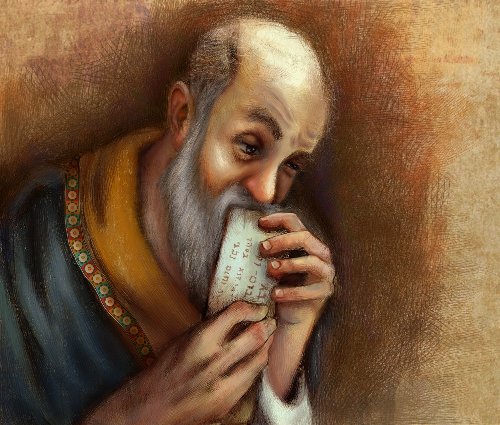
Continued from Part 37
Introduction
Shabbat Shalom kol beit Yisra'el and Mishpachah and welcome back to the 36th part of our journey through the Book of Revelation, probably the hardest book of Scripture to understand. If that is the case - and I think there are many who would agree with me - then it is my further contention that the events of the second Interlude between the 2nd and 3rd Woes - or between the 6th and 7th Shofar blasts - are the hardest part of the Book of Revelation to interpret. Not surprisingly, then, there are so many different interpretations that require you to go down various unsatisfactory rabbit trails that I neither have the time or inclination to go down or explain as they lead only to confusion.
Continuation of the Second Woe
Strictly speaking this Interlude consisting of two parts - the Little Scroll (chapter 10, which we'll cover today) and the Two Witnesses (Revelation 11:1-14, which we'll cover next week) - are part of the Second Woe (Rev.11:14), so none of this material is unrelated. Given the highly symbolic nature of the Second Woe so far, we should realistically expect 'more of the same' in the next two parts. Bear that in mind before you allow your mind to go wandering off into contemporary politics and world events in search of applicability right now. I always advise great care when approaching prophetic - and especially apocalyptic - literature. Unfortunately those with itching ears prefer the sensationalism of the moment, however wrong it may be, to the careful unpacking and hard work that serious students are more disposed towards.
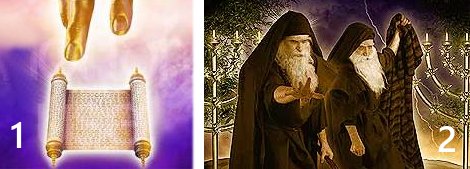 The 'Little Scroll & Two Witnesses' Interlude are part of the Second Woe
The 'Little Scroll & Two Witnesses' Interlude are part of the Second Woe
Review of the Second Woe - Loosing the 200 Million
But let us first quickly review last week's material which covered the Second Woe, beginning with the sounding of the Sixth Shofar or Trumpet. A voice from the golden altar at last answers the prayers of the martyrs under the altar crying for vindication and vengeance (Rev.9:13; cp. 6:9ff & 8:3), by commanding the four malakim (angels) bound at the River Euphrates to be loosed (Rev.9:14). Immense armies of supernatural beings - 200 million of them - described as horsemen whose steeds had the heads of fire-breathing lions and tails of snakes with their heads, issued forth, and killed a third part of humanity (but not the godly Remnant) which we estimated to be, very roughly, about 2 billion souls. We also spent some time looking at the history of the Euphrates River as a boundary between major world empires where their fates were frequently settled.
Witchcraft, Drugs and Idolatry
We ended with a long discussion on the Greek work pharmakeia which is commonly, and correctly, translated 'sorcery' or 'witchcraft', but which also comingles with drug-taking. We looked at the destructiveness and idolatry of both drug-abuse and alcohol-consumption, with a footnote on tobacco which is where we ended.
The Ruling Princes or Malakim of Nations
But we are still none the wiser as to who the four bound malakim (angels) are so I thought I would drop in a possible identification. First of all, though the idea of four bound malakim (angels) may be new to us (and indeed to the Bible up to this point), this was in actual fact a familiar apocalyptic idea. We are told that each country has its ruling malak (angel) or malakim (angels) who are described as supernatural, not human, 'princes'. Two, you may recall, are made mention of by Daniel (10:13,20), namely, the 'Prince of Persia' and the 'Prince of Greece'. So it is quite within the realms of possibility that these four malakim (angels) were the ruling 'princes' of Babylon in the supernatural realm. These beings were held, as it were, on a leash until the exact moment foreordained by Yahweh (Rev.9:15). Paul makes reference to them in his letter to the Colossians where he informs us that Yah'shua the Messiah (Jesus Christ), "having disarmed principalities and powers, ...made a public spectacle of them, [and] triumph[ed] over them ['by means of the cross' - JNT]" (Col.2:15, NKJV).
The Four Bound Malakim at the Euphrates
This informs us, clearly, then, that these malakim (angels), are not good beings but fallen Princes whom Yahweh uses as He did the locust-like creatures in the First Woe. We may justifiably call them the Four Princes of Babylon - four, because they represent all the devilish adversarial princes across the whole world (the number 4) since Babylon encompases the whole world system and its demonic governments. So, yes, all nations who do not bend the knee to Yah'shua (Jesus) are governed by dark supernatural entities or 'princes'. There is, or are, therefore, a Prince (or Princes, depending how powerful that nation is) of the United States, of Great Britain, of China, of Russia...of all nations. Yah'shua (Jesus) has disarmed them all by the cross so they are chaffing at the bit for revenge. More about them another time.
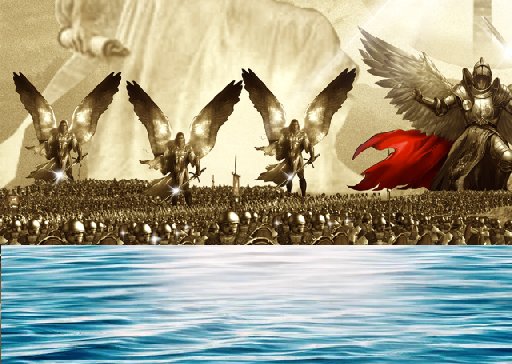 Four bound malakim at the Euphrates chaffing at the bit to wreak vengeance
Four bound malakim at the Euphrates chaffing at the bit to wreak vengeance
Visions About the Book of Revelation
And finally, before we get underway with Chapter 10, I want to say something about a remark I made at the beginning of this course, namely, that Yahweh has been showing me things about the Book of Revelation in visions and why I have said next to nothing about them thus far. The reason is that I wish to first let the text of the Davar (Word) speak for itself first - that is the primary revelation and must therefore be given the pre-eminence.
REVELATION 10:1-11
Let's now read the 10th chapter together.
"1 I saw still another mighty ('strong' - KNT) malak (angel) coming down from heaven, clothed ('robed' - NIV; 'dressed' - KNT; 'wrapped in' - JB, NRSV, ESV) with ('surrounded by' - NLT) a cloud. And a rainbow was on ('above' - NIV; 'over' - JNT, JB) his head, his face was like the sun, and his feet ('legs' - NIV, HRV) like pillars of fire. 2 He had a little scroll (book) ['lying' - JNT] open ('unrolled' - Barclay) in his hand. And he set ('planted' - NIV, JBP) his right foot on the sea and his left foot on the land, 3 and cried with a loud voice, as when a lion roars. When he cried out ('shouted' - NIV), seven thunders ('thunderclaps' - JNT) uttered their voices ('spoke' - NIV) (cp. Rev.8:5; 11:19; 16:18). 4 Now when the seven thunders ('thunderclaps' - JNT; 'claps of thunder' - JB) uttered their voices, I was about to write; but I heard a voice from heaven saying to me, 'Seal up the things which the seven thunders uttered, and do not write them.' 5 The malak (angel) whom I saw standing on the sea and on the land raised up his hand to heaven 6 and swore by Him (Yahweh) who lives forever and ever ('of the timeless ages' - JBP), who created heaven and the things that are in it, the earth and the things that are in it, and the sea and the things that are in it (Neh.9:6; Ex.20:11; Ps. 146:6), that there should be delay no longer, 7 but in the days of the sounding (trumpet/shofar call) of the seventh malak (angel), when he is about to sound, the mystery of Elohim (God) would be finished ('accomplished' - NIV), as He declared to His avadim (servants) the nevi'im (prophets).
"8 Then the voice which I heard from heaven spoke to me again and said, 'Go, take the little scroll (book) which is open in the hand of the malak (angel) who stands on the sea and on the earth.' 9 And I went to the malak (angel) and said to him, 'Give me the little scroll (book).' And he said to me, 'Take and eat it; and it will make your stomach bitter ('sour' - NIV), but it will be as sweet as honey in your mouth.' 10 Then I took the little scroll (book) out of the malak's (angel's) hand and ate it, and it was as sweet as honey in my mouth. But when I had eaten it, my stomach became bitter ('sour' - NIV). 11 And he said to me, 'You must prophesy again about many ['different' - JB] peoples, nations, tongues ('languages' - NIV), and kings'" (Rev.10:1-11, NKJV).

From Angels to Prophets and Prophecy
I wonder if you have noticed the change in focus between the 6th and 7th shofars? Now our attention is being diverted to the human channels through which the divine revelations are communicated. Before it was all about malakim (angels) - now it is about nevi'im (prophets) and prophecy (10:11 and, presently, 11:3,6). At the beginning of the messianic æon (age), the apostle John on Patmos is the navi (prophet); at the end of it, as we shall see next week, it will be the two key 'witnesses' who will prophesy in the city of Jerusalem.
Prophecies Not to Be Uttered Yet
There is a sense of impending disaster in the spectacular appearance of two mighty malakim (angels). The terrible truths uttered by the first in a thunderous voice are for John alone and must not be communicated to anyone else - compare this with the man Paul speaks of who was caught up into Paradise to hear things man is not permitted to tell of (2 Cor.12:4). The second malak (angel) announces there will be no more delay in the build-up of events - the 7th shofar will be a climax (a reason many believe that the 7th Seal, the 7th Shofar (Trumpet) and the 7th Bowl or Vial are describing one and the same event, and not three consecutive ones which resemble each other).
The Little Scroll - a More Detailed Version of the Earlier One?
The last and worst part of the 'bad news' is about to be given in this second sequence of 7. It is on a 'little scroll' - perhaps an expanded, more detailed version of part of the larger one already opened? John is told to 'eat it' or 'digest it'. It will taste 'sweet and sour', sweet at first but sour when it begins to sink in which is a bit like the reaction many have to the whole Book of Revelation itself when they begin to grasp its message.
Description of the Strong Malak
Let's now look at some of the details as we take the text verse by verse:
"Then I saw another strong (mighty) malak (angel) coming down from heaven, dressed in a cloud. Over his head was a rainbow; his face was like the sun, and his feet were like fiery pillars" (Rev.10:1, KNT)
Could, I wonder, this be the same malak (angel) described at the beginning of chapter 5?
"Then I saw in the right hand of Him who sat on the throne a scroll with writing on both sides and sealed with seven seals. And I saw a mighty ('strong' - KNT) malak (angel) proclaiming in a loud voice, 'Who is worthy to break the seals and open the scroll?'" (Rev.5:1-2, NIV).
Still Under the Effects of the Sixth Shofar
It could be. But there are other things to be take into consideration before we arrive at any sort of conclusion. At this point it is important to know that we are still under the effects and consequences of the sounding of the 6th Shofar (Trumpet). Why? Because it's not until chapter 11 and verse 14 that we're told that this 'Second Woe' Shofar (Trumpet) as being 'past'. As chapter 7 was episodal or sporadic or irregularly occurring to the 6th Seal, so chapters 10-11:14 are episodal or sporadic or irregularly occurring to the 6th Shofar (Trumpet) since there's clearly some sort of parallel here, again one of 3, for they would say it continues the same prophecy of judgment but introduces new details connected with that judgment...and new subjects and phases of it.
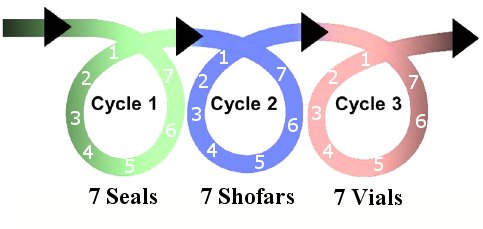 Three cycles are sometimes similar but not identical events
Three cycles are sometimes similar but not identical events
My belief, as I have already expressed, is that we're seeing two separate judgment events which are reflections of one another in type, that's to say, we are simply seeing the same tavnith or pattern repeat much as in the Book of Judges where we see the same pattern of prosperity, apostacy and rescue by a Judge repeated even though they are clearly separate events, because this is how human nature works with stark predictability.
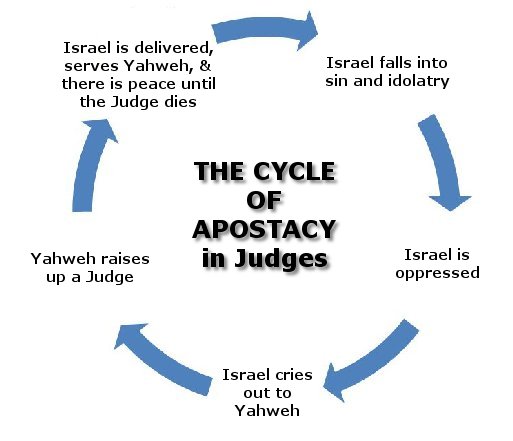
And since we are made in Yahweh-Elohim's image we should not be surprised that Yahweh operates in a similar, though perfect, pattern but this time of heavenly 7's and not earthly 4's.
A Majestic, Powerful Malak from Heaven Descending
One thing that's clear is that this 'mighty' or 'strong' malak (angel) isn't a shofar (trumpet) malak (angel) but, as the text says, 'another'. He descends from heaven with great majesty, the cloud surrounding him testifying of his dignity because in prophecy clouds are generally associated with divine movements (Ps.18:11; 104:3; Is.19:1; Ezek.1:4; Mt.24:30) - indeed, we are witnesses to one of these majestic malakim (angels) right at the beginning of the Book in chapter 1, being the Saviour Himself as He is the unique divine Malak (Angel, Messenger) of the Divine Presence who is prominent in the Exodus story too:
"Look, He is coming with the clouds,
and every eye will see Him,
even those who pierced Him;
and all the peoples of the earth will mourn because of Him.
So shall it be! Amen" (Rev.1:7, NIV).
Parallels Between the Angel from Heaven & the One from the Deep Pit
So this malak (angel) comes down from heaven as the great antagonist of the 'malak (angel) of the very deep pit or abyss/'bottomless pit' who comes up from below and who in turn is envelloped in the cloud of the smoke of the pit. Yahweh always deals with fallen malakim (angels) by sending heavenly ones of comparable authority and power. So I believe we will even be able to name this heavenly malak (angel) without too much difficulty in a minute!
Decoding the Rainbow
 Before we forget the not unimportant detail, why do you think this as yet unnamed malak (angel) has a rainbow above his head? What could this signify? Fortunately, this is not a difficult symbol to decode as we are given the explanation by the navi (prophet) Ezekiel:
Before we forget the not unimportant detail, why do you think this as yet unnamed malak (angel) has a rainbow above his head? What could this signify? Fortunately, this is not a difficult symbol to decode as we are given the explanation by the navi (prophet) Ezekiel:
"Then there came a voice from above the expanse over their heads as they stood with lowered wings. Above the expanse over their heads was what looked like a throne of sapphire, and high above on the throne was a figure like that of a man. I saw that from what appeared to be his waist up he looked like glowing metal, as if full of fire, and that from there down he looked like fire; and brilliant light surrounded him. Like the appearance of a rainbow in the clouds on a rainy day, so was the radiance around him. This was the appearance of the likeness of the glory of Yahweh. When I saw it, I fell facedown, and I heard the voice of one speaking" (Ezek.1:25-28, NIV).
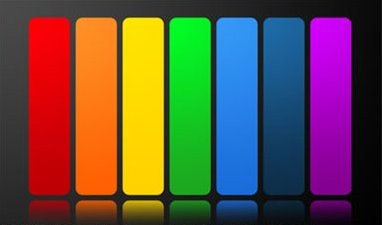 The rainbow is simply a different arrangement of
The rainbow is simply a different arrangement of
divine perfection reflected in the primary colours
The Four Living Creatures, Zoa or Seraphim
These are the Living Creatures in the Throne Room whom we also met in chapter 4 of the Book of Revelation, the Zoa or Seraphim. Why the rainbow in particular? Because it represents Yahweh's pledge never to destroy the earth again by flood (Gen.9:8-17). Those who, as it were, 'wear' the rainbow as an emblem over their heads indicate their closeness to Yahweh and their high rank. They are heavenly royalty of some kind. Who this 'other mighty/strong malak (angel) actually is we will identify in a moment. (Clue: It isn't Yah'shua/Jesus).
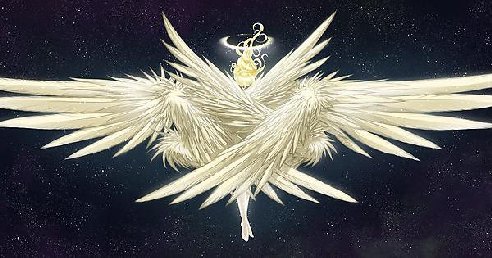 One of the Living Creatures, Zoa or Seraphim in the Throne Room
One of the Living Creatures, Zoa or Seraphim in the Throne Room
Sounding the 7th Shofar is All That Remains Now
Let's go ahead and add verse 2 to the opening statement of Revelation 10:
"Then I saw another strong (mighty) malak (angel) coming down from heaven, dressed in a cloud. Over his head was a rainbow; his face was like the sun, and his feet were like fiery pillars. He was holding a small scroll, open, in his hand. Placing his right foot on the sea and his left on the land..." (Rev.10:1-2, KNT)
So the scroll which was opened points us, as I said, to chapter 5, and seems to show that nothing now remains but to sound the 7th and last shofar (trumpet). This, the malak (angel) says in verse 6, shall take place without further delay. The sealed scroll has been opened, and now the little scroll, not sealed, discloses new directions. Later in the passage John devours its contents and continues his prophetic duty, whilst the judgments take different forms and have different subjects. Its contents must surely refer to the future, and begin where the other scroll (chapter 5) ends. Moreover, it relates specifically to Israel and Israel's ancient enemy, Babylon.
Identifying the Mighty Angel
Who, we must then ask ourselves, is the mighty malak (angel) that 'stands' for, or 'protects', the children of Israel? Let's take a look in Daniel 12:
"At that time Michael, the great prince who protects your people, will arise. There will be a time of distress such as has not happened from the beginning of nations until then. But at that time your people - everyone whose name is found written in the book - will be delivered" (Dan 12:1, NIV).
The Great Prince
Notice that Michael is called "the great prince" in this verse and two chapters earlier refers to "Michael, your prince" (Dan 10:21, NIV) and a few verses before that one, we read:
"But the prince of the Persian kingdom resisted me twenty-one days. Then Michael, one of the chief princes, came to help me" (Dan.10:13, NIV).
A Supernatural, Nation-Ruling Prince or Angel
And this 'Prince of Persia', was, you will remember, not a human but a powerful, supernatural nation-ruling malak (angel), and antagonistic to Yahweh's Kingdom. So there are angelic Princes on both 'sides' with Michael here rescuing Daniel. Jude 9, moreover, tells us that this Michael is an archangel. And as we shall see later in chapter 12 of Revelation presently:
"...there was war in heaven. Michael and his malakim (angels) fought against the dragon, and the dragon and his malakim (angels) fought back. But he (the dragon) was not strong enough, and they lost their place in heaven. The great dragon was hurled down - that ancient serpent called the devil, or Satan, who leads the whole world astray. He was hurled to the earth, and his malakim (angels) with him" (Rev.12:7-9, NIV).
 The mighty warrior archangel and prince Michael is stronger than Satan
The mighty warrior archangel and prince Michael is stronger than Satan
Yah'shua as Malak of the Covenant
That's pretty clear, then. The powerful or mighty malak (angel) is what in Hebrew is called a 'Prince' and in Greek an 'archangel' or 'ruling angel' in charge of many other malakim (angels). Moreover, Michael is even stronger than Satan! So whatever Satan's position before the Fall was, and whatever power he once possessed, though still a powerful supernatural being, there are other malakim (angels), let alone Yahweh Himself, of course, who are much more powerful than him. Now I earlier gave you a clue telling you that this mighty malak (angel) could not be Christ who is sometimes called the 'Malak (Angel, Messenger) of the Covenant', for He is not merely 'another malak (angel)' or messenger. Today's text says 'another malak (angel)' or a lesser strong malak (angel). Nevertheless he sufficiently resembles Christ in many ways as to understandbly be mistaken for Him by commentators.
The Mighty Malak is Almost Certainly Michael
Everywhere else in the Book of Revelation 'malakim mean malakim', that's to say, 'angels mean angels', and are always distinct from Divine Persons with the exception of the 'Malak (angel, Messenger) of the Covenant' who is the Son of Elohim (God), Yah'shua the Messiah (Jesus Christ). Throughout, they are seen to be ministers of the Divine Will. They are invested with such delegated glory and attributes as befits their special missions, respectively. And though all the evidence seems to point to today's 'mighty malak (angel)' being Michael, the text does not specifically identify him and so it is perhaps wise to leave it at that.
Guides and Protectors
His legs (or 'feet' in some translations like the KJV and NKJV) are described as being like 'fiery' pillars. Pillars once more recall the Exodus, and specifically the pillar of fire by night and the cloud by day, so the firm resolve and glory of Yahweh is in view here. Things are going to get done now and no one will be in any doubt. Exodus imagery reappears throughout the Book of Revelation as in Revelation 8:12 which reminds us of the thick darkness that fell upon Egypt for 3 days (Ex.16:21-23). What was the function of these pillars? They guided (Ex.13:21-22) and protected (Ex.14:19,24) the Israelites which is likewise a function of malakim (angels). So Yahweh's people will be guided and protected through all of this Tribulation - they won't, as so many evangelicals believe, have already been raptured away to avoid it all. They will be equipped to navigate these tough times with considerable divine help.
The Divine Thunders
Let's read on:
"Placing his right foot on the sea, and his left on the land, [the strong malak/angel) shouted in a loud voice like a lion roaring. When he roared, the seven thunders answered with their own voices. When the seven thunders spoke, I was about to write, but I heard a voice from heaven. 'Seal up what the seven thunders said,' instructed the voice. 'Don't write it down'" (Rev.10:2b-4, KNT).
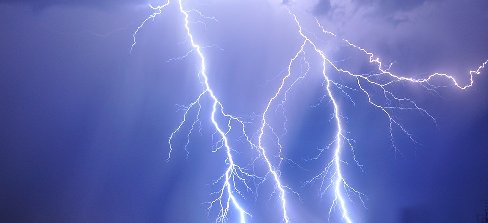
Sealed-Up Prophecies from Daniel's Time
This isn't the first time we have encountered prophecies that are sealed up until the last times when they will be opened. The best known of these from the Tanakh (Old Testament) are in the Book of Daniel:
"The vision of the evenings and mornings that has been given you is true, but seal up the vision, for it concerns the distant future" (Dan 8:26, NIV).
"But you, Daniel, close up and seal the words of the scroll until the time of the end. Many will go here and there to increase knowledge....Go your way, Daniel, because the words are closed up and sealed until the time of the end" (Dan.12:4,9. NIV).
So identification of the ten thunders is not until our day, or the next (and last) generation's day.
Generalised and Particularised Thunders
We have met these thunders once before...in the throne room coming from the throne as well as from the four Seraphim, only then they were generalised and in today's passage they are particularised:
"From the throne came flashes of lightning, rumblings and peals of thunder" (Rev.4:4-5, NIV).
"Now I saw when the Lamb opened one of the seals; and I heard one of the four living creatures (Zoa, Seraphim) saying with a voice like thunder, 'Come and see'" (Rev.6:1, NKJV).
"Then the angel took the censer, filled it with fire from the altar, and threw it to the earth. And there were noises, thunderings, lightnings, and an earthquake" (Rev.8:5, NKJV).
And we shall encounter them again later on at least four more occasions (Rev.11:19; 14:2; 16:18; 19:6).
Are the Seven Thunders the Voices of Yahweh?
What are these 'thunders' and why are there seven of them? Could, as some suppose, they be the "voice of Yahweh" manfested 7 times in Psalm 29:3-9? Let's see:
"The voice of Yahweh1 is over the waters; the Elohim (God) of glory thunders, Yahweh thunders over the mighty waters.
The voice of Yahweh2 is powerful; the voice of Yahweh is majestic.
The voice of Yahweh3 breaks the cedars; Yahweh breaks in pieces the cedars of Lebanon.
[The voice of Yahweh]4 makes Lebanon skip like a calf, Sirion like a young wild ox.
The voice of Yahweh5 strikes with flashes of lightning.
The voice of Yahweh6 shakes the desert; Yahweh shakes the Desert of Kadesh.
The voice of Yahweh7 twists the oaks and strips the forests bare. And in his temple all cry, 'Glory!'" (Ps.29:3-9, NIV).
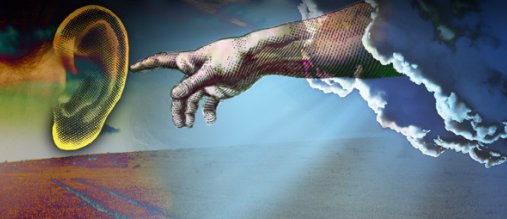
Seven as a Divine Judgment Action Number
Obviously Yahweh has spoken more than seven times generally and not just by means of waters, power, breaking cedars, calves of Lebanon, lightning, earthquakes and twisting oaks. The number 7 is simply being used as a poetic device to show this is Yahweh's doing. A better example, if we're looking for some kind of correspondence, would be the 7 times Yahweh spoke to Noah (Gen.6:13; 7:1; 8:15; 9:1,8,12,17) showing, at least, that 7 distinct actions are involved and no more. One thing that is certain is that thunder is always associated with divine punishment and this time it anticipates the judgment to fall on those who refuse Yahweh's love and grace.
Seven Consecutive Messages or Decrees
The seven thunders are messages and/or decrees. They are consecutive and are heard by John in heaven as 'thunder', just as when a voice from heaven spoke to Yah'shua (Jesus) on earth, some of the people present "heard it said that it had thundered. Others said, 'A malak (angel) has spoken to Him.' Yah'shua (Jesus) answered and said, 'This voice did not come because of Me, but for your sake. Now is the judgment of this world; now the ruler of this world will be cast out'" (John 12:29-31, NKJV). These also may have been malak (angel) voices, the effect (i.e. thunder) being put, by metonymy (like 'the crown' substituting for 'the monarch'), for the cause. Thus Yahweh's voice appears as 'thunder' or 'rushing water' to some (those who are not supposed to understand) or as words to those who are supposed understand.
The Prophet Concealed the Words
The point being, that John heard what the voices said, and understood, because he was about to write it down. But Yahweh wanted these words concealed and ordered the navi (prophet) not to commit the words to paper. So anyone trying to 'prophetically' reveal what the words are ahead of time is clearly false for Yahweh would not reveal them. That has not, alas, stopped people from doing so. Indeed one early Protestant commentator claimed these seven thunders were the Papal Bulls issued against Luther and the Reformation! Had that been so, then Yahweh would have sealed the words in vain for then everyone would know what those thunders mean. So, no, Yahweh's purpose in this document is very different from man's ideas of it.

The Season is Near for Revealment
True, in chapter 22:10 which we've yet to come to, John was told "Do not seal up the words of the prophecy of this book (the Book of Revelation)" (KNT) but there were certain things sealed as there were, as we've seen, with Daniel (Dan.8:26-27; 12:9). A whole dispensation (the Old Covenant) was to pass before Daniel's words could be known. But here, we're told, 'the season is near'.
Correspondences
The actions of this malak (angel) and their results are then set forth in exactly the same form as were those of the sixth malak (angel) in chapter 9, verses 13-21. They correspond in the same six particulars (see the Appendix at the end of this article).
The Giant Christ-Like Malak
Let's continue with verses 5-7:
"Then the malak (angel) whom I had seen standing on the sea and the land raised his right hand to heaven and swore an oath by the One who lives for ever and ever, who made heaven and what it contains, the earth and what it contains, and the sea and what it contains. This was the oath: that there would be no more time (delay), but that Elohim's (God's) mystery would be completed in the days of the voice of the seventh malak (angel), who was going to blow his shofar (trumpet). That is what he had announced to His servants the nevi'im (prophets)" (Rev.10:5-7, KNT).
The Oath
The malak (angel) has an interesting stance, does he not, with one foot on the sea, one on land - to show that Yahweh is the Master of the whole planet and the universality of His message - and with his right hand raised to heaven. This is a mighty big malak (angel)! Though I have never seen such gigantic malakim (angels) I know one or two brethren who have. The raising of the right hand is what one does to take a solemn oath or vow (Dan.12:7; cp. Mt.5:33-34) which is clearly what the malak (angel) is doing here. It is raised toward heaven because this is where Yahweh lives. Three different spheres of the created order are united as one (Rev.5:13; Gen.1:6-10) as their divine Creator is invoked to witness the malak's (angel's) oath (cp. Dan.12:7; Gen.14:22; Dt.32:40). And incidentally, that an oath is being made at all is fatal to the theory that this malak (angel) is Yah'shua (Jesus) especially in the face of Matthew 5:33-37 which is about performing oaths to Yahweh.
The Resurrection Unification of Heaven and Earth
So what is this 'mystery'? In apocalyptic thought mysteries were usually thought of as secrets that were preserved in heaven and revealed to the apocalypticist (John in this case); but here the mystery is that Yahweh has won the victory over the forces of evil and will reign for ever and ever, le-olam-va-ed. This mystery is to be revealed when it is sounded at which point it will become clear that it is Yahweh's plan to unite, or join together, with resurrection power all things in heaven and on earth, at least at the end of the Millennium. Like our own spirits and physical bodies, heaven and earth are to become inseparably connected into a permanent singularity - there will be no more dichotomy between spirit and body, between inner and outer (see, for example, Olive Branch 76), because this is an immortal sphere where spirit and body cannot ever be separated. And this unity will be accomplished under Messiah's headship:
"His plan was to sum up the whole cosmos in the king (Yah'shua/Jesus) - yes, everything in heaven and on earth, in Him" (Eph.1:10, KNT)
 Spirit and matter will be inseparably unified in resurrection power
Spirit and matter will be inseparably unified in resurrection power
The Prophet's Declaration in the Chain of Command
And just as importantly, for us, John's word will bring it all to pass because this is how prophecy works. There is a sequence in which Yahweh's Davar or Word is carried out, or should I say, there is a 'chain of command':
Yahweh1 -> Yah'shua (Jesus)2 -> A Malak (Angel)3 -> a Navi (Prophet)4 -> Israel5
This sequence - this line of action - is purposeful and most important. This is what is meant in Daniel 7:14,22,27 when it is said that Yahweh's people will share His rule over the world. Yahweh rules by His Davar (Word) as the Lamb will do in the Final Judgment (Rev.19:15); but here the Davar (Word), as we shall see in a moment, is what is given the navi (prophet) to eat, to digest, and to speak. The Davar (Word) must become integral with the soul. More about that in a minute. This pathway or 'chain-of-command' also has as its purpose to make visible to all, the sovereignty by which the Son now orchestrates every event for the welfare of the Messianic Community (Church), His Bride (Eph.1:20-22).
The Long Season of Waiting is Over
This 'mystery' also includes the unrestrained expression of Yahweh's wrath, signified in the coming Bowl or Vial Judgments, toward all who resist the Creator's reign (Rev.15:1) where 'finished' renders the same verb teleo meaning 'fulfilled'. It is the Grand Consummation of the Æons (Ages)! Everything is being made visible - at last! The season of waiting for the martyrs beneath the altar is finally at an end. Now is the time of vindication! Unrepentant sinners are to be destroyed off the earth - because the new world is too good for them - never to return, because theirs is a different inheritance after the final Reconciliation has taken place way in the distant future, and the righteous Kingdom is finally established.
'Eat the Scroll!'
We shall now end with the concluding verses of today's passage:
"The voice I had heard from heaven spoke to me again. 'Go,' it said, 'and take the open scroll from the hand of the malak (angel) who is standing on the sea and on the land.' So I went up to the malak (angel). 'Give me the little scroll,' I said. 'Take it,' he said to me, 'and eat it. It will be bitter in your stomach, but sweet as honey in your mouth.' So I took the little scroll from the malak's (angel's) hand, and I ate it. It tasted like sweet honey in my mouth, but when I had eaten it my stomach felt bitter. 'You must prophesy again,' he said to me, 'about many people, nations, languages and kingdoms'" (Rev.10:8-11, KNT).
How the Genuine Prophet Engages With the Word of Yahweh
Eating the scroll is a vivid metaphor for the way in which the navi (prophet), then or indeed today, can only speak Yahweh's Davar (Word) insofar as it has become part of the navi's (prophet's) own life. The job of a true navi (prophet) isn't simply to relay the words that Yahweh gives him to speak - he has to become so intimately connected to those words so that they become a living, existential or experiential reality within him - he needs to engage not only his mind but his heart too. Only this way can he speak the words as Yahweh Himself would speak them, only this way can He become an essential link in the chain of transmission of the heavenly Davar (Word), incarnating that Davar (Word), as it were, on our human plane of existence. As a result the navi (prophet) both shares in the responsibility for delivering that Davar (Word) as well as involving the righteous as a whole in the consequences of his prophecy by adding Yahweh's people - Messianic Israel - to the chain of command and linking them directly back to Elohim (God), for we, in our turn, are passing these prophecies on to others! And remember this is all happening in a New Covenant setting too - it isn't just what 'Old Testament' nevi'im (prophets) did in the past. Don't forget that.
 The true prophet is deeply & personally impacted by Yahweh's prophecy
The true prophet is deeply & personally impacted by Yahweh's prophecy
An Encounter With Two False Prophetesses
This is an extremely important concept that needs to be grasped. Many years ago when I was deeply grieving over my wife leaving me and was desperately seeking solace and a word from someone operating in the prophetic to give me hope for reconciliation and restoration. I went online to a prophetic group run by two women and shared my story. They claimed to be nevioth (prophesses) and were very bold in making prophetic statements. The 'word' I got back from them was devastating - I was entirely to blame, they said, and I needed to repent, even though it was she who had run off and committed adultery. They had no empathy whatsoever. I was vulnerable and willing to act on any true Davar Elohim (Word of God). I knew that what they spoke was not from Yahweh but from a mischievous spirit. They were harsh toward everyone going to them for guidance, not just me.
The Prophet has Empathy for the One Judged but Isn't in Agreement
You see, a true Davar (Word of) Yahweh, whatever it is - positive or negative - will always taste sweet because it is true. But if it is negative, the navi (prophet) will immediately find himself in the pain of the one receiving the negative judgment and he will experience the devasting effect of the message he brings, which comes directly from Yahweh, on the wicked person or nation receiving it. This will create empathy but not, obviously, agreement.
Ezekiel to the Rebellious Israelites
This prophetic metaphor you may recognise from a previous usage in the Book of Ezekiel in which the Tanakh (Old Testament) navi (prophet) likewise receives a scroll from a malak (angel). Listen to the similar wording:
"He said: 'Son of man, I am sending you to the Israelites, to a rebellious nation that has rebelled against Me; they and their fathers have been in revolt against Me to this very day. The people to whom I am sending you are obstinate and stubborn. Say to them, 'This is what Yahweh-Elohim says.' And whether they listen or fail to listen - for they are a rebellious house - they will know that a navi (prophet) has been among them. And you, son of man, do not be afraid of them or their words. Do not be afraid, though briers and thorns are all around you and you live among scorpions. Do not be afraid of what they say or terrified by them, though they are a rebellious house. You must speak My words to them, whether they listen or fail to listen, for they are rebellious. But you, son of man, listen to what I say to you. Do not rebel like that rebellious house; open your mouth and eat what I give you.'
"Then I looked, and I saw a hand stretched out to me. In it was a scroll, which he unrolled before me. On both sides of it were written words of lament and mourning and woe.
"And He said to me, 'Son of man, eat what is before you, eat this scroll; then go and speak to the house of Israel.' So I opened my mouth, and He gave me the scroll to eat.
"Then He said to me, 'Son of man, eat this scroll I am giving you and fill your stomach with it.' So I ate it, and it tasted as sweet as honey in my mouth.
"He then said to me: 'Son of man, go now to the house of Israel and speak my words to them. You are not being sent to a people of obscure speech and difficult language, but to the house of Israel - not to many peoples of obscure speech and difficult language, whose words you cannot understand. Surely if I had sent you to them, they would have listened to you. But the house of Israel is not willing to listen to you because they are not willing to listen to Me, for the whole house of Israel is hardened and obstinate. But I will make you as unyielding and hardened as they are. I will make your forehead like the hardest stone, harder than flint. Do not be afraid of them or terrified by them, though they are a rebellious house.'
"And he said to me, 'Son of man, listen carefully and take to heart all the words I speak to you...'" (Ezek.2:9-3:1-3, NIV).
 Ezekiel eating the scroll given to him
Ezekiel eating the scroll given to him
Eating as Receiving Knowledge
Now Yahweh doesn't directly say that the words would be bitter in the navi's (prophet's) stomach but the text clearly implies it will give him a stomach ache. Ezekiel experiences in his soul what Israel will experience, and it distresses him. The same with John. To 'eat' in both contexts is a Hebrew idiom meaning to receive knowledge in much the same way as in the English language we have a similar idiom, 'You will eat your words' - in other words, what you say negatively against me you shall be forced to retract. If someone tells you something important which they want you to ponder carefully over, we'll often say that we're 'digesting' or 'ruminating on' his words - giving them time to impact us.
Understanding Eating His Flesh and Drinking His Blood
This is very important because Yah'shua (Jesus) in John's Gospel tells His listeners that they cannot become His true talmidim (disciples) unless they eat His body and drink His blood (Jn.6:47-48,53-54, cp.1 Cor.12:13 with Lk.13:15). The reason most of His listeners walked away wasn't because He was implying that He was telling them that they had to cannibalise His body but because He was telling them they had to become more than mere listeners of the Davar (Word) to follow Him - they had to actually believe Him - have faith in Him, trust Him, and as you all know the Hebrew word for 'faith' is emunah is pro-active, requiring a response: to believe in Him is certainly to trust in Him but it also means obeying Him and living our His mitzvot (commandments). In other words, receiving the Besorah (Gospel, Good News) isn't mere intellectial assent and then walking away - it's actually living out the teachings, that's to say, living a New Covenant Torah lifestyle.
No True Prophet is Insensitive to Suffering
So the words John utters in his Apocalypse are indeed sweetness and bitterness to him - sweetness, because the martyrs under the altar, who have been praying day and night for a divine response to their suffering, will finally be vindicated; bitterness because of what this means for the wicked. He feels for both as does Yahweh! And that's the point. No true navi (prophet) is insensitive to the suffering the wicked must endure for their rebelliousness. He cares because Yahweh care; and he cares the way Yahweh cares because he is legitimately connected to Him by the Ruach haQodesh (Holy Spirit). False nevi'im (prophets) don't care - they are disconnected from the impact their words will have on others - on those to whom their words are directed. And that ought to be true not only of nevi'im (prophets) but of believers in general who are admonished by the Saviour many times to carefully measure their words and not speak inadvisedly in the passion of the moment because negative words can deeply wound. That is why it is better to be silent than to blurt out something that will hurt someone unnecessarily.
The Hardened Brow
There's a lot of important emet (truth) in these verses, isn't there? We just have to dig a bit and that requires some effort and investment of time when you are studying Scripture. The general message here is that we need to receive Yahweh's Davar (Word) in our hearts as well as our minds otherwise we have not received it properly or completely. Those two so-called 'prophetesses' thought they were 'acting prophet-like' by being harsh and blunt because Yahweh hardened Ezekiel's brow but totally misunderstood what that passage meant which was simply the navi (prophet) should not be afraid of a negative response to his preaching. It did not mean he should become hard-hearted and cold. Quite the opposite. It was, after all, the brow that Yahweh hardened, behind which lay the mind, and not the heart. In other words, Yahweh removed from His servant any temptation to dilute or liberalise the message out of fear of a hostile reaction from his listeners.
A Warning Neither to Add Nor Subtract
Finally, although John will see peoples, nations and languages resisting Christ and his witness (Rev.11:9; 13:7; 17:15) and kings will ally themselves with evil (Rev,6:15; 16:12-14; 17:2,18; 19:18-19) in hearing his message, he must deliver it nonetheless, word-for-word, without changing - adding or subtracting - anything, which is what the conclusion to the Book of Revelation is talking about when Yah'shua (Jesus) says:
"I warn everyone who hears the words of the prophecy of this book [of Revelation]: if anyone adds to them, Elohim (God) will add to him the plagues described in this book [of Revelation], and if anyone takes away from the words of this book of this prophecy, Elohim (God) will take away his share in the tree of life and in the qadosh (holy, set-apart) city (New Jerusalem) which are described in this book [of Revelation]" (Rev.22:18-19, ESV).
Abuses
That ought to serve as a dire warning to liberals who want all the 'sweet' truth but none of the 'bitter' truth, and to ultra-conservatives who lack connection to peoples' hearts and use the Bible as a cudgel to beat souls into the Kingdom. Both are diabolical abuses and the reward for such abusers is not a happy one.
No Futher Delays Allowed
So 'take and eat the scroll' quite simply means to grasp and digest fully its contents (cp. Ps.119:103). Why does it turn the stomach sour? Because in the bigger picture the message of the little scroll will involve suffering - that's the 'bad news' part, but the 'good news' - represented by the taste as sweet as honey in the mouth - is that Yahweh's eternal purposes will experience no further delay. To wrap up and end this evil world system which every righteous soul wants, entails suffering which no one wants really but which is inevitable and unavoidable. The prophecy of Revelation 10, therefore, has to be issued again following the sounding of the 7th shofar in Revelation 11:15. But before we examine that, there is a second part to the present Interlude which we'll examine next week - the Two Witnesses.
Conclusion
This has been a little longer than usual but only because there are so many vitally important principles that need to be properly grasped before we move on. Both our minds and hearts have to be properly aligned so that we speak and act righteously and avoid what those two false prophetesses did to me - steal my hope, offer no real solutions, and to leave me feeling worse off that I was before I went to them for counsel. Until next week (and Rosh Chodesh tomorrow), may Yahweh bless you and continue opening your minds and hearts nto the glories of His Davar (Word). Amen!
Continued in Part 39
Acknowledgements
[1] Tom Wright, Revelation for Everyone - The New Testament for Everyone Commentary Series, Vol.19 (SPCK, London: 2011)
[2] E.W.Bullinger*, Commentary on Revelation (Kregel Classics, Grand Rapids, Michihan: 1984)
[3] David H. Stern, Jewish New Testament Commentary (JNT Publications, Clarksville, Maryland: 1992)
[4] ESV Study Bible (Crossway, Wheaton, Illinois: 2011)
*E.W.Bullinger was a brilliant Anglican clergyman and scholar whose works merit careful study by serious students of the Bible. He was, however, seriously in error in at least three main areas, namely, (1) he believed the 'Church' has been raptured before the Book of Revelation opens, (2) he believed that the 7 churches in Revelation 2-3 are 7, literal Jewish churches or assemblies yet to come, and (3) he believed in a pre-tribulation, pre-millennial rapture.
APPENDIX
SYNOPSIS OF REVELATION 6-16
The Seven Seals
- 1. White horse - military aggression
- 2. Red horse - bloodshed
- 3. Black horse - famine
- 4. Pale Green/Blanched/Pallid/Sickly-looking horse - disease, epidemics
- 5. Persecution & prayer
- 6. Tremour & terror
INTERLUDE I (Ch.7)
(The 144,000 Redeemed)
- 7. Silence in heaven, listening to prayers which are then answered in a final catastrophe: a severe earthquake I
The Seven Trumpets/Shofars
- 1. Scorched earth
- 2. Polluted sea
- 3. Contaminated water
- 4. Reduced sunlight
- 5. Insects and plague (for five months) (1st Woe)
- 6. Oriental invasion (200 million army) (2nd Woe)
INTERLUDE II (Ch.10-11)
(The Malak with the Little Scroll)
(The Two Witnesses)
- 7. The Kingdom comes, the world is taken over by Yahweh & Yah'shua (Jesus) after a severe earthquake II (3rd Woe)
INTERLUDE III (Ch.13-14)
(The First & Second Beasts)
(The Lamb & the 144,000)
(The Messages of the Three Malakim)
The Seven Bowls/Vials
- 1. Boils on the skin
- 2. Blood in the sea
- 3. Blood from the springs
- 4. Burning by the sun
- 5. Darkness
- 6. Armageddon
- 7. Hailstorm (OB 368:11-12) and severe earthquake III, leading to international collapse
 Click the image for the whole Series
Click the image for the whole Series

 V386
V386
|


